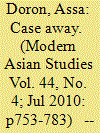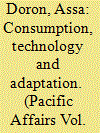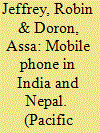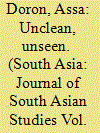|
|
|
Sort Order |
|
|
|
Items / Page
|
|
|
|
|
|
|
| Srl | Item |
| 1 |
ID:
096272


|
|
|
|
|
| Publication |
2010.
|
| Summary/Abstract |
Mayawati's recent victory, in May 2007, in the Uttar Pradesh elections has been hailed as a 'spectacular display of subaltern power'. The questions remain: who are these subalterns? To what extent do they form a coherent block, with similar fears, hopes and aspirations, and how are subalterns' visions of the state, social justice and equality articulated? This paper explores some of these questions, by examining the example of the boatman community in Banaras, belonging to the Mallah (Nishad) caste, and the strategies they use to be heard as legitimate citizens of the state. Such strategies and techniques reveal a sophisticated and organized apparatus of caste and community associations that call into question some recent theoretical formulations of the Indian state as one dominated and manipulated by powerful elites, while subalterns remain passive or, at best, compliant.
|
|
|
|
|
|
|
|
|
|
|
|
|
|
|
|
| 2 |
ID:
113968


|
|
|
|
|
| Publication |
2012.
|
| Summary/Abstract |
On the edges of the digital world in India, there are millions of mobile phone users. To cater for these consumers, an economy of mobile phone care and repair has emerged in almost every town. Through the experiences of consumers and repairers, this article explores technology distribution, service practices and economic opportunity. How do they learn their trade? How do they make a living? And how do they position themselves in relation to the official branded manufacturers and licensed agents? Conceptually, the article is concerned with the nexus between consumer culture, the Indian middle class and the poor and how they engage global capitalism. It argues that middle-class ideologies and practices of consumption are both exclusive and expansive. At the same time, the poor seek to engage this economy by tapping into the unauthorized sector that responds to their demands for local participation in the global economy, while keeping them also at a certain distance from the forms and symbolic capital of the new economy.
|
|
|
|
|
|
|
|
|
|
|
|
|
|
|
|
| 3 |
ID:
113963


|
|
|
|
|
| Publication |
2012.
|
| Summary/Abstract |
This article scans the effects of mobile-phone communication, particularly in South Asia. It focuses on three important areas: political economy, politics and social practices. By 2012 India had more than 900 million telephone subscribers, 96 percent of them on cell phones, and the majority of users were the poor. At the other end of the social scale, the mobile phone provoked bitter struggles among some of India's biggest business houses and branches of government, and was responsible for criminal cases against politicians at the highest level.
The essays in this volume are a reminder that technology is anything but neutral. The essays examine the many facets of mobile phone communication and the institutions, agents, mechanisms and networks such communication relies on. The essays contribute to efforts to interpret the effects of this technology and to gain insight into the most important aspect of the mobile phone: the sheer variety of activity (political, social and cultural) on which it impinges.
|
|
|
|
|
|
|
|
|
|
|
|
|
|
|
|
| 4 |
ID:
075612


|
|
|
| 5 |
ID:
149778


|
|
|
|
|
| Summary/Abstract |
Successive Indian governments have attempted to tackle the formidable task of creating a clean India, with varied results. With the country's rapidly growing middle class eager to participate in a sanitised global consumer capitalism, many Indians are becoming frustrated with the ‘unruly’ nature of their urban landscape, its dirty streets and public spaces. This is particularly discernible amongst India's middle-class youth, who seem impatient with the state's apparent inability to manage waste and disorder, and it is clear that several civil society campaigns designed to promote a clean India explicitly target Indian youth. In this paper, I explore what the ideological premise of cleansing initiatives reveals about the aspirations, needs and anxieties of India's youth.
|
|
|
|
|
|
|
|
|
|
|
|
|
|
|
|
|
|
|
|
|